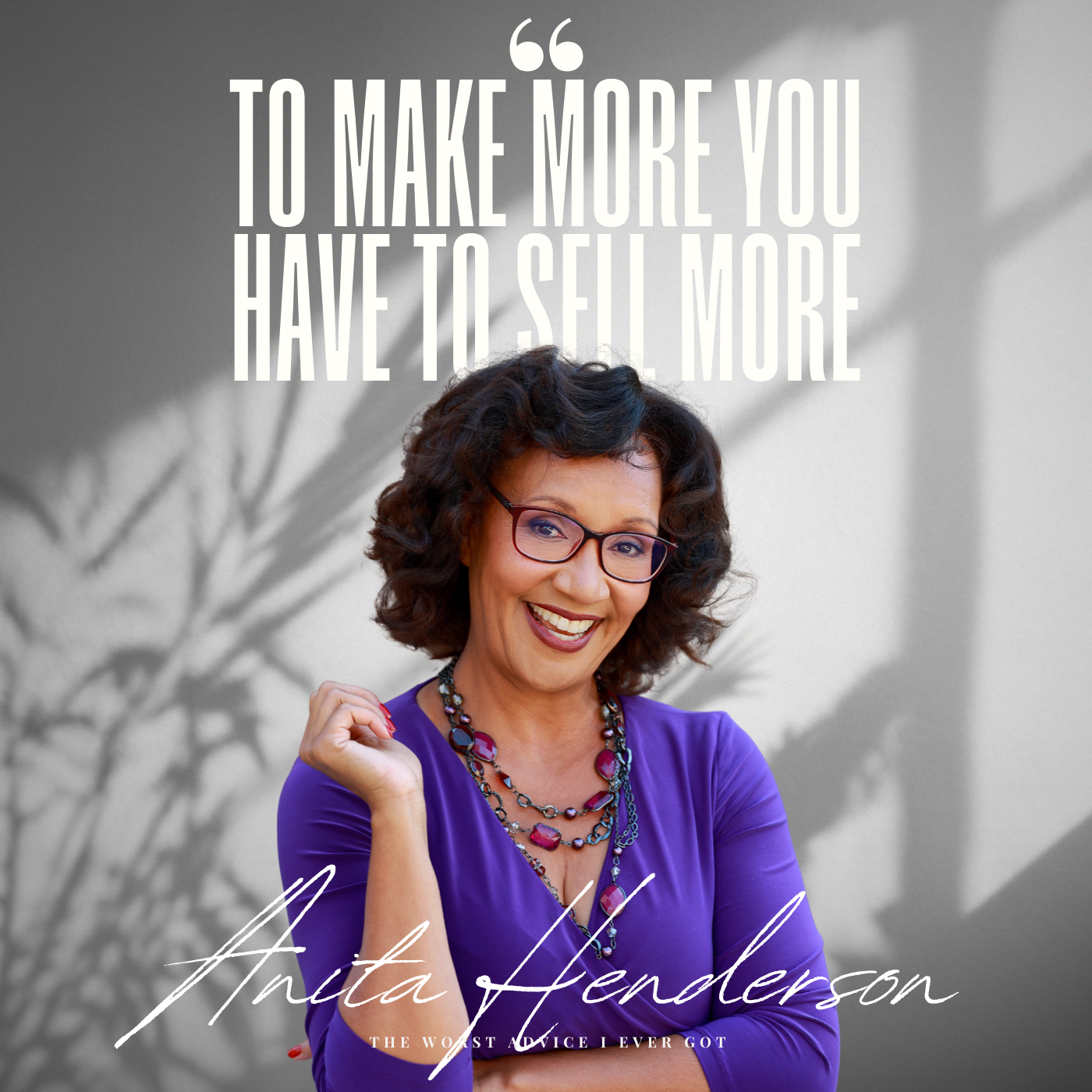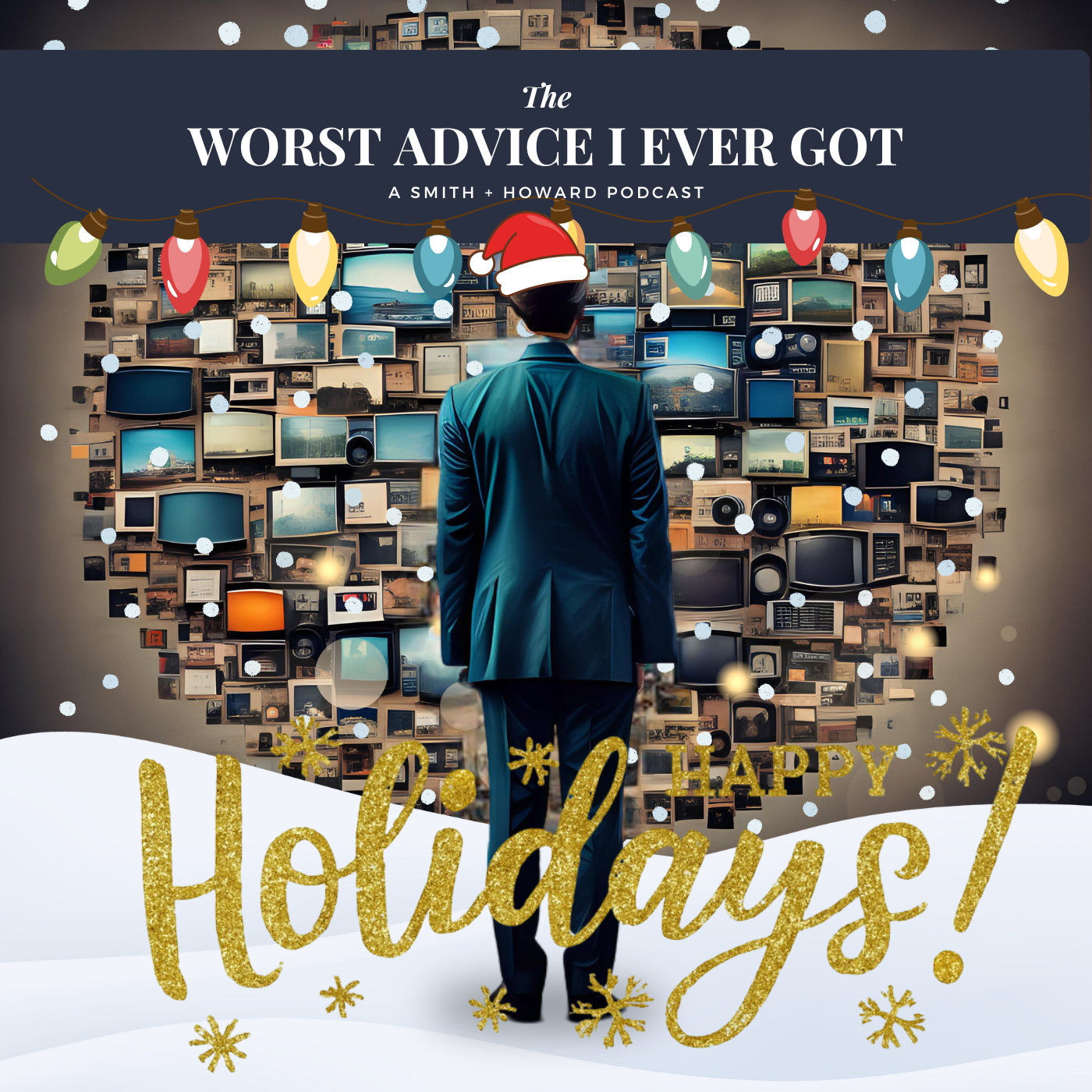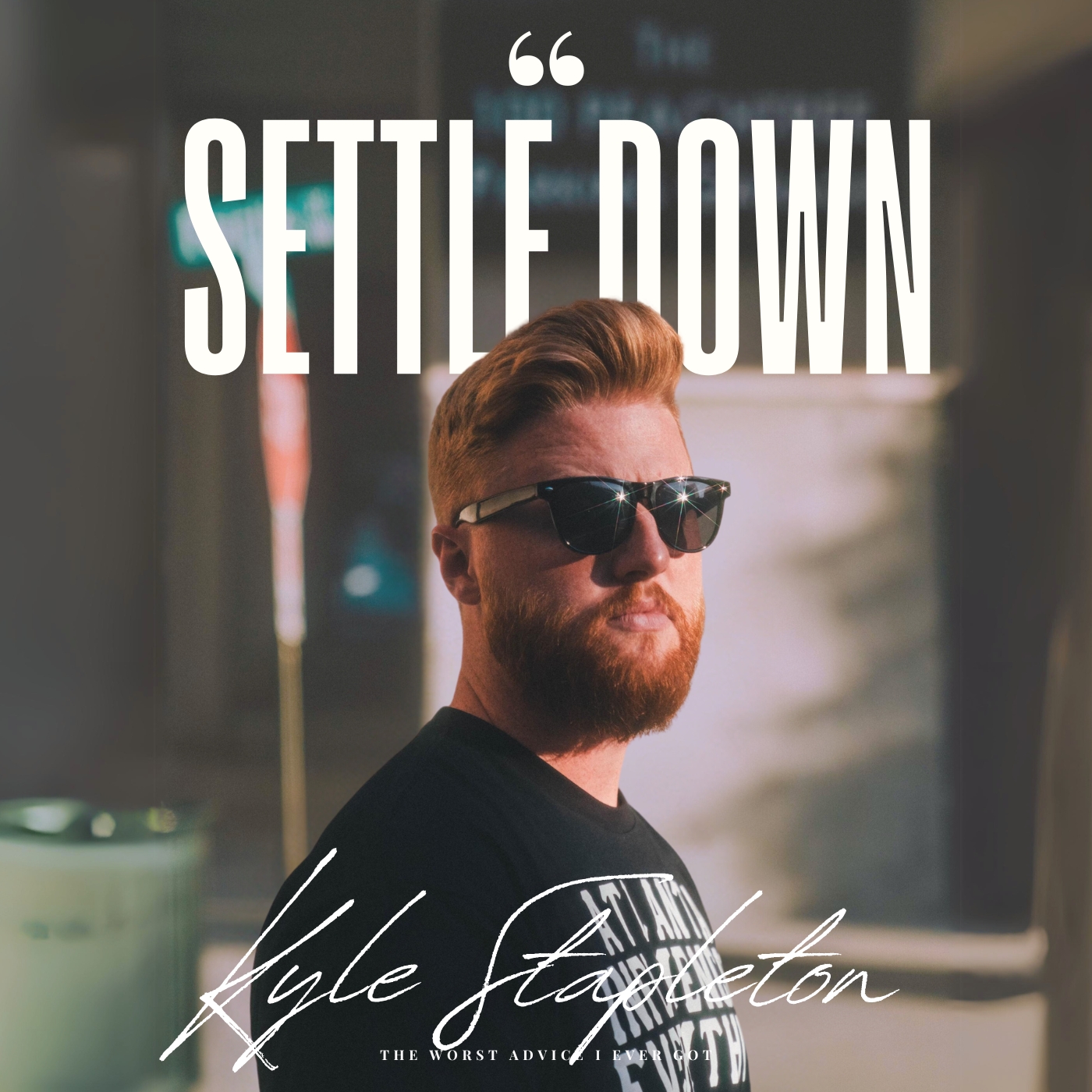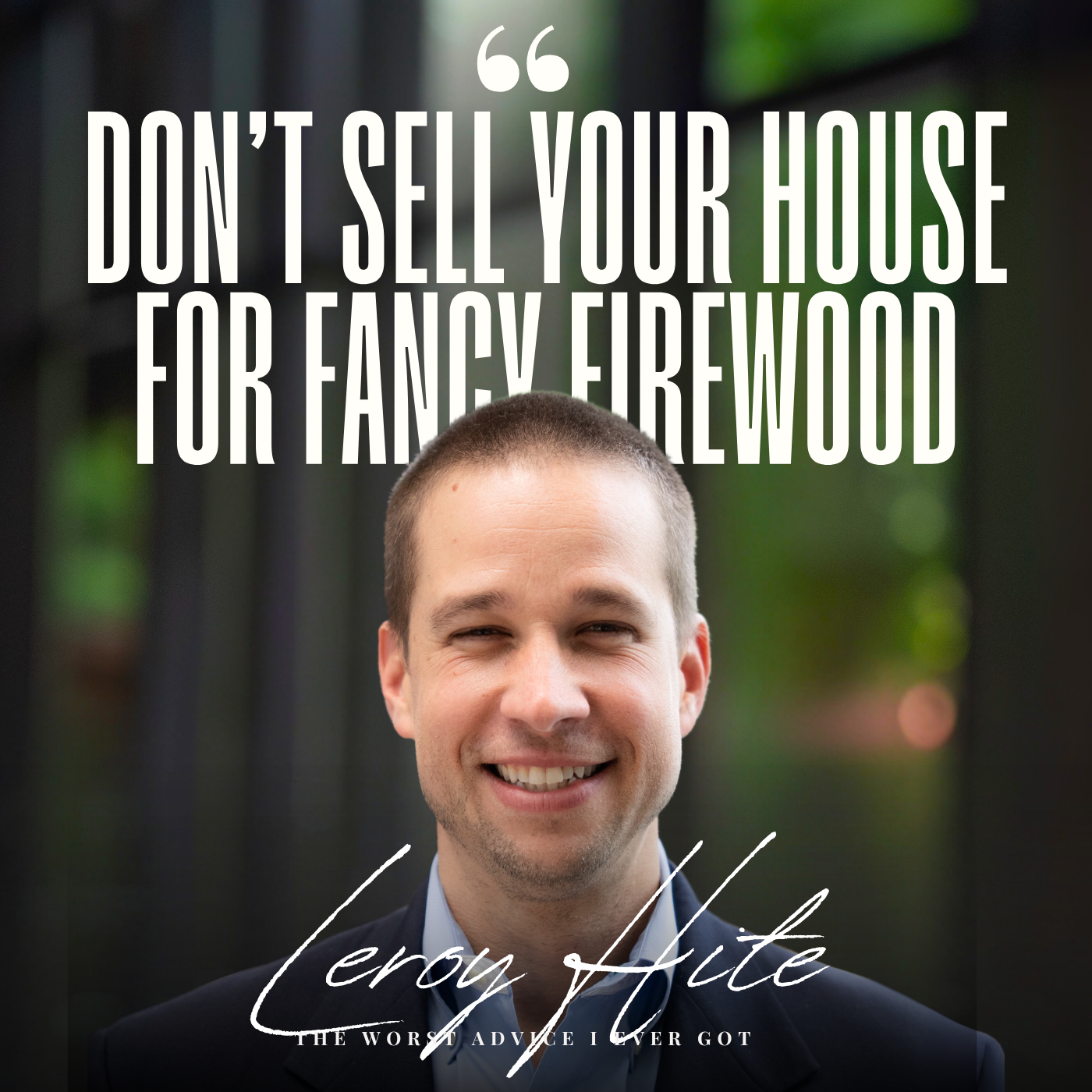Episode Transcript
[00:00:00] Speaker A: Foreign.
[00:00:06] Speaker B: Welcome to another episode of the Worst Advice I Ever Got. I'm your host, Sean Taylor, and today we're joined by Anita Henderson. Anita has been a solo entrepreneur for over 25 years, helping people tell their stories and build their brands. As the founder of the Right Image. She's also the author of the book Becoming the Minimalist.
Lessons from My Journey to Work Less, Earn More, and Play More. Let's get to it. Anita, thanks for joining us today.
[00:00:36] Speaker C: Good to be here, Anita. We don't beat around the bush on this podcast. We get right to brass tacks and ask, what was the worst advice you ever got?
[00:00:47] Speaker D: The worst advice I ever got is to make more, you have to sell more.
[00:00:56] Speaker C: Okay. To make more, you have to sell more.
Feels logical, but I know there's a story behind it. So let's get into you and your story. Tell us more about you and we'll tee up where this advice came from.
[00:01:07] Speaker D: Oh, wow. As a solo Entrepreneur for over 25 years, I've pivoted my business a few times. My company is the right image consulting. I started out as a marketing, communications, PR person, strategist, and then after about a decade pivoted into the book publishing space. So specifically focused on independent book publishing back in the days when the publishing industry was being flipped upside down and things were changing. And as most entrepreneurs, you have to figure it out, what's my service? What am I doing? Who am I doing it for?
How do I get new clients in the door?
[00:01:50] Speaker C: Have you always been so on your own or did you start in more of a team environment, corporate environment?
[00:01:57] Speaker D: Well, I've been in corporate prior to starting my company for a couple of decades and realized that I was forcing myself as a square peg into a round hole and I had to just call it quits.
And Honestly, over my 20 some odd years in business, I dipped my toe back in corporate a couple of times and reminded myself that this is not for me. So. So, yes, as a business owner, I have always been solo, which doesn't mean that I've always done everything myself in my business. I have brought on contractors, subcontractors to support me because business is busy, right? It gets that way sometimes. I can't do everything.
I learned that over the years. But yeah, I've always been solo. It's been me.
[00:02:47] Speaker C: So let's get into this worst advice where you heard it, who told it to you when you heard it. I'd like to dig in a little bit. Let's talk a little bit more about that.
[00:02:57] Speaker D: That worst Advice has come from a lot of different places. It's the gurus, it's the folks who make money by teaching other solopreneurs to do all these things that we really don't need to do. Not all at the same time, that's for sure. So I heard it from multiple sources and because I was gaining my foot footing and my grounding in my space, I listened to it. I listened. It sounded good, it made sense. Okay, yeah. If I want to earn more, then I need to sell more.
[00:03:32] Speaker C: And, and I'm presuming the timing on this, but tell me if I'm wrong. I'm presuming the timing kind of came about as you were embarking on your own.
[00:03:40] Speaker D: Right, Sure. I heard it early in the growth of my business, early this, the start of my business. And then again I mentioned, I pivoted my company and started hearing it all over again anew. Because by then it was 10 years in to being an entrepreneur and there were all these new platforms and automations and technologies that didn't exist when I first started my company. So hearing it for the second time, I thought this, there must be something to this. I've got to adopt this approach if I want to keep my business going.
[00:04:15] Speaker C: Yeah. And the sources of this, who you're hearing it from, you described them earlier as gurus. These are people who in their own right were probably successful. So I'm assuming the advice appealed to you.
[00:04:26] Speaker D: Absolutely. I mean, they're telling me they're the six figure, seven figure, eight figure people. I'm thinking I want some of that. Right. So let me do all this extra stuff that they're telling me to do. Let me work harder and, you know, sell more and create more. This sort of hyper marketing approach, hyper content creation was pitched as something that's absolutely necessary if you want to earn more.
[00:04:53] Speaker C: Can you just describe a little bit when you, when you really said, I'm going to adopt this, the things that you were doing and what the pros and cons were to it, it was a lot.
[00:05:02] Speaker D: It was a lot. So some of the things that were taught, suggested, recommended to do in terms of this hyper content creation and hyper marketing, you've got to a course, you've got to have a newsletter and it's got to be consistent. It has to come out every week. You have to have a membership group. Right. You have to do free webinars, you should do a live event. Oh my gosh, you said, and no offense to you guys, you gotta have a podcast.
And no offense to me as the author's midwife, you gotta have a book. You have to do a TED Talk. Like, I'm tired just thinking about all of these things. And no one said, choose one and see how it works. It was like, just throw it all up against the wall.
[00:05:51] Speaker C: So spaghetti on the wall, right?
[00:05:53] Speaker A: So you're doing all these different things and you're, what are you, what's your success level that you're seeing? Is it working?
[00:06:00] Speaker D: I'm sleepy, I'm tired, and I'm seeing very little results. Sure it was tough. There's 24 hours in a day, right? How many of those things can you do well in 24 hours? So I did not see the results that were promised. But me and my go getter self, I kept trying. Maybe I'm doing something wrong. Let me tweak it here or there and keep going.
[00:06:24] Speaker C: Yeah, maybe I'm doing something wrong. Let me tweak it. Or it could be just that. There's just the time that it takes. Like you just have to invest more time.
Maybe I'm not doing enough, right? That had to creep into your mind as well.
[00:06:37] Speaker D: Sure. Maybe I'm not doing enough. Maybe I'm not doing it right. Let me take another course and figure out how to do this thing.
[00:06:43] Speaker C: So the cracks in the advice for you start showing themselves in the lack of results. Like, when did you start to see this? More than just, I need to do more. But maybe this isn't the right advice.
[00:06:56] Speaker D: About five years into my pivot in my business, in the book publishing space, I joined a partnership. And early on we adopted the same hustle hyper creation approach. I brought it to the table and so did they. And we started out on the fast track. We did have a podcast, we did have a membership group, we did create a course, we had a newsletter. We did all the things to sell, sell, sell more, more, more, earn more. It was crazy. I don't even know how we did it, but it didn't take long. We had a huge, we launched a program and had a huge launch. It was fantastic. It was like a pretty mid five figure launch and we were super proud of ourselves. So we thought, maybe it does work, maybe the advice does work. We're going to keep at it. And we continued to do more, we created more, we marketed more, and it seemed like we hit our peak with that one big launch day.
[00:08:03] Speaker A: So you never replicated that?
[00:08:05] Speaker D: We did not replicate it.
[00:08:07] Speaker C: Did having those partners help you get to the conclusion that maybe you needed to take a different course or Was it self actualization? Did you realize it for yourself or did having this partnership help you get there?
[00:08:20] Speaker D: It was more self actualization. And then it was convincing them that I've been doing it wrong, that all our hustle and grinding is not working.
[00:08:30] Speaker C: How did that go?
[00:08:31] Speaker D: It was difficult. You know, myself and one of the other partners were on the same page and the other partner thought, maybe if we just add one more thing, maybe if we try this a little longer. Right. Let's throw in some social media ads. Okay, that'll do it. That's the answer. And we just had to put our foot down and decide, this is not working.
[00:08:56] Speaker A: And to your point, it was a little bit working. And then you're also hearing it from everywhere. Right. You're still. Are you still hearing that advice during this time?
[00:09:04] Speaker D: Even after our big fat launch day, which was super exciting? Yes. We were still hearing, keep creating, keep doing it. Do what you can to replicate more, more, more. And you can actually double what you did before if you just keep doing more.
[00:09:21] Speaker C: What was the emotional and financial impact of all of these activities?
[00:09:26] Speaker D: Emotionally, it was extremely difficult. You start to question yourself, am I really doing this right? Is this really, for me, a little bit of imposter syndrome kicks in. That lack of confidence, maybe I'm not good enough. Maybe I'm faking it too much and I'm still not making it right.
[00:09:52] Speaker C: You weren't questioning the advice and its validity. You were questioning yourself. You said, what am I doing wrong?
Imposter syndrome. Isn't that funny how it immediately was an inward question of yourself versus a question of the process or the advice?
[00:10:08] Speaker D: Sure. I thought, well, again, these gurus and these advice givers, they seem to be successful. They were touting the 6, 7, 8 figure results to do what I say and you'll get this result.
So clearly there was something I wasn't doing right. Right. Why wasn't it working for me?
[00:10:29] Speaker C: You start dipping your toe into the water of a different approach. Right. Let's talk about this shift.
[00:10:40] Speaker D: Well, I will say that after about five years with this business partnership, we decided, that's enough.
[00:10:49] Speaker C: We're dissolving the partnership and going back out on our own. That was step one.
[00:10:53] Speaker D: That was step one. Let's dissolve this partnership. We're all working too hard for too little.
[00:10:58] Speaker A: That's when you found out this was the worst advice you ever got.
[00:11:02] Speaker D: That was the moment I decided that that terrible advice I had been following for five, six, seven years, I would not bring that into my venture.
[00:11:17] Speaker C: Fresh. Venture fresh. Start, so to speak. What was the. What was the new way of doing things?
[00:11:24] Speaker D: The new approach was less is more. Less is more, not more is more.
[00:11:31] Speaker C: What's an example of doing less to earn more?
[00:11:37] Speaker D: Well, the thought of having to serve more people equals earning more money. That was the lie. Right? That was the advice I bought into. I asked myself a question.
If my goal is to earn a million bucks, what if I didn't have to serve 1,000 people in order to do that $1,000 thing? What if all I had to do was serve four people at 250k a pop? 250.
[00:12:07] Speaker C: Yeah.
[00:12:08] Speaker D: I actually have a strategic publishing partner I work with who asked, what's the fastest way for us to make a million dollars in this coming year? And my response, let's come up with a $250,000 package and find four people who see the value in it.
[00:12:26] Speaker C: Yeah. Yeah. The determination of this new high value offering. Talk about that journey. Because that's a pivot again.
[00:12:36] Speaker D: It is a pivot, and it required me to release the imposter syndrome. When you're not certain of yourself, then you're not certain of the value you offer to others and you are timid in your pricing. It caused me to actually really journey into becoming the minimalist entrepreneur, Meaning I had to consider that I could actually serve fewer people and earn the same amount that I was earning before or more. But I had to value my services. I had to do three really critical things for me. One was clarify. The second was simplify. And the third thing was focus. I had to clarify, what am I doing? What is the service I'm offering? And then I had to simplify what I was doing. Uncomplicated. It doesn't have to be super complex. And then just focus on that. So eliminating all of the extras and finding my one thing and doing it really well and then charging for it.
[00:13:42] Speaker A: Was it difficult to make that shift, like, into, did you get clients right away? Was it a long time? How'd that work?
[00:13:50] Speaker D: It was not difficult to make the shift. What it required was developing some processes to really examine what I do and how I do it, and understanding that there's value and uniqueness in my approach to book publishing, book writing, book editing, understanding that I have a unique approach and understand being able to lay out the steps that I take all of my clients through so that I could see, oh, there's value here. They get a lot out of this. I'm not charging enough.
[00:14:28] Speaker C: Yeah, Values. Value based pricing to start with. Right. And then simplifying and focusing on that value based pricing. Probably some of the first things you have to do is pass on opportunities that for your entire history you had been taking. Oh, wow, here's another client. Let me grab a hold. But now you've got clients that are coming in that don't fit this new profile. Right?
[00:14:51] Speaker D: Yeah, that's, that's the hungry entrepreneur who says yes to everything. Right. Because you got to sell more in order to earn more. Right. But when I became the minimalist entrepreneur and got very clear on what I offer and got very comfortable with my pricing and the value associated with it, no became a sentence with a period at the end and it became easier and easier to determine projects that were a good fit and were not. Think about how much time any listener out there right now, how much time you spend with a client who's given you a headache. And you probably knew in the beginning of that relationship that there would be a headache, but because they said, I'll plop down the dollars you're asking, you took it.
[00:15:42] Speaker C: Was it really hard to get away from this volume based sales approach and really commit and stick to this qualified candidate, qualified project approach?
[00:15:54] Speaker D: I'll say there were some difficult times and I did say yes to some projects I shouldn't have. Right. And that's the learning. That's the learning curve.
[00:16:04] Speaker C: What are some examples of things that people can do to say no, but make it sound like something better than a no?
[00:16:12] Speaker D: Yeah, wrap your no in some honey and send them on their way. So no, we're not a good fit. However, I do know someone I can refer you to that is a better, could be a better fit for you.
No, your project doesn't really work for me. But here's some resources that I've created or that I know of that could help you get to the next point. No, this is not a good project or no, we shouldn't work together. Perhaps you should spend a little more time thinking about your whatever. Right. So give them something to think about, give them a referral, or give them some resources that can help them on.
[00:16:50] Speaker A: The other side of it. Like me, for example, as someone who's stuck in the content hamster wheel of, yeah, sure, I'll do that. How do you get those people out?
[00:17:00] Speaker D: Wow.
I would think that if anyone's out there and the hustle and grind of yeah, I'm doing more and I am actually making more, if that's working for you, I would say step back and look at your lifestyle. Right, Lifestyle. As an entrepreneur, I think Is everything we get to choose. We've chosen entrepreneurship for a reason or multiple reasons. And for most entrepreneurs I've talked to, freedom is one of them. However you define freedom, freedom of time, freedom to choose who you work with, freedom to choose the projects. You accept that kind of thing. And so if even though the work more, push more, sell more is getting you more, I want you to step back and ask yourself, is it also giving you more of the reason you began your entrepreneurial journey in the first place?
[00:18:07] Speaker A: Yeah.
[00:18:07] Speaker E: More What.
[00:18:10] Speaker C: Anita? How does someone actually shift the business model without having to go through what you went through?
[00:18:19] Speaker D: I will say that it was good that I was afflicted.
We learn things in life and we progress through experiences. They're all necessary. So I have no regrets for what I've been through. I don't know that I had to go through it. I will go back to those three tenets of the minimalist entrepreneur, and I think when we get focused on those things, we may be able to avoid some of what I went through. Clarify, simplify, focus.
When you know what you're doing, why you're doing it, and who you're doing it for, that's a great foundation.
[00:19:02] Speaker C: You still have to be doing some type of marketing, some type of selling. So how did you decide what of those activities to continue to do and which things to eradicate?
[00:19:12] Speaker D: Yeah, you have to assess, having done all the things I had to assess. So I'm a list person, Right. So I listed out all those things that I did and sort of did a comparison, and I was actually looking for the intersection between working less and earning more.
What took me the least amount of time to earn the most amount of money. It was the flip of the advice I had gotten, which was do more to earn more.
[00:19:44] Speaker C: So you start taking your own advice, really here, and you start seeing the success, and it really motivates your business and you.
So much so that you actually have gone another step and written a book about this.
[00:19:59] Speaker D: Yeah. The book is Becoming the Minimalist Entrepreneur Lessons from My Journey to Work Less, Earn More, and Play More. And it is a memoir of exactly what we've been talking about, my journey to get from this terrible advice. The worst advice I ever got into a more comfortable, confident space of really enjoying owning my business and having it be a profitable business.
[00:20:33] Speaker A: It's all about your definition of more, because both times, you know, we've got the word more twice in the worst advice you've got, but also in your book title, you've got more. So what Is your more and trying to figure out how to do that and not focusing your more on time. Not more content, not more things, more freedom, more money.
[00:20:53] Speaker C: Yeah. What does more mean to you?
[00:20:54] Speaker D: Yeah, it's self defined for everybody. We typically think about more as a measurable thing, like numbers. But more could be enjoyment. Right. It could be intangible.
And we know when our intangible more is there, we feel more relaxed. Right. We feel less stressed. We feel a sense of I'm in the right place right now. Right. Even if it's not perfect, I'm in my more. I have an abundance of what I've been seeking and I'm good. I'm well right now.
[00:21:33] Speaker C: Well, I'm very thankful that one of the things you didn't cut out of your activities was being guests on podcasts, because you've been a great guest today. And I'm grateful today that you shared some of your experiences with our guests. So thanks so much for joining us, Anita.
[00:21:49] Speaker D: Thank you.
[00:21:52] Speaker B: You know, jb, when Anita said the worst advice she ever got was to make more, you have to sell more, I thought, okay, this is going to be a sales strategy episode. But it turned into something so much deeper.
[00:22:04] Speaker E: Yeah, it's less about sales and more about, like the emotional toll of overextending yourself. You know, she was doing everything with courses and newsletters and webinars and memberships. And you said, how did that go? And she said, I'm sleepy, I'm tired, and I'm seeing very little results.
[00:22:19] Speaker B: Yeah, that hit that, that hit, you know, the, the promise of that advice. Sounds so logical. Work harder, create more, sell more, get more. But for Anita, at least, it just wasn't working.
[00:22:33] Speaker E: Yeah, it's not just the work too. It's like the self doubt, the idea that it's not working. You know, you must be the problem. She said, you know, maybe I'm not good enough. She never was really looking at the advice being bad. She was like, I must be doing something.
[00:22:45] Speaker B: And I think that's what turned it all around. You know, that realization that ultimately she didn't need more clients, she needed better alignment, higher value, more focus, you know, clarity around what really worked for her, that was better alignment for her.
[00:23:02] Speaker E: Right. Those are the three steps that she went to, you know, clarify, simplify, focus. You know, that's her new framework. And it's not just about earning money, even though that was a byproduct. You know, it's about building a business that, you know, supported her life and not one that ran into the ground.
[00:23:17] Speaker B: Yeah, yeah. And, and, and also her version of.
[00:23:20] Speaker C: Of quote, unquote, more.
[00:23:22] Speaker B: Right. More calm for her, more freedom for her.
[00:23:25] Speaker E: More purpose and, you know, less content for content's sake.
[00:23:29] Speaker B: Well, today's content was not just for content's sake, that's for sure. And we truly, truly want to thank all of our guests, just like Anita, who show up and provide such great content with what they've gone through. So be sure to come back next week for the next episode of the Worst Advice I Ever Got.



